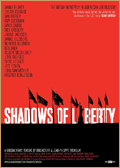HotDocs: Shadows of Liberty + Where Heaven Meets Hell
Just uploaded are the first two of several capsule reviews of films at Toronto’s HotDocs Film Festival, with screenings spread out over 10 cinemas in the downtown core.
 First up is Jean-Philippe Tremblay’s Shadows of Liberty [M] (2012), which had its world premiere at the revamped Bloor Cinema. Although it’s face-on a slick alert about the current state of media empires and their monopolistic endeavors in America, most viewers ought to notice striking similarities in their own towns & cities, regardless of what country they live.
First up is Jean-Philippe Tremblay’s Shadows of Liberty [M] (2012), which had its world premiere at the revamped Bloor Cinema. Although it’s face-on a slick alert about the current state of media empires and their monopolistic endeavors in America, most viewers ought to notice striking similarities in their own towns & cities, regardless of what country they live.
In the packed balcony at the Bloor, it was easy to hear little murmurs among nearby audience members who quickly noted the changes that have similarly occurred in Canada. The similarities between Canada and the U.S. are quite stark, since the CRTC may have less teeth and spine than the FCC, be it with ownership of media streams in large markets, metered internet billing, negative billing, and total vertical integration.
There’s a déjà vu factor for Canadians because the domination of singular entities has been ongoing for decades, be it U.S. control of cinema screens, Bell exploiting their control of the telecommunications infrastructure (which they admittedly built), Rogers’ virtual control of the cable industry in provinces like Ontario, and the CBC’s own struggle to remain distinct as its financial resources continue to be eroded by government funding.
Cross-media systems and total vertical integration have been in practice in Canada for years, and there’s no turning back the clock, so while the U.S. struggles to find a balance between monopolistic entities and the preservation of a free press, we’ve already lost the battle. Bell is easily the most oft-cited villain because it owns print media, TV stations (CTV), and cable TV stations; it’s the internet provider that owns the lines third-party firms must ride; and it’s already geared the programming it carries into junk convergence.
News isn’t packaged, it’s manufactured from non-news items. When CTV carried Canadian Idol [CI], for example, anchors, weather & health reporters blissfully commented on the prior night’s CI show; the manufactured excitement was branded “idol mania,” and call-in segments were regularly devoted to the ‘events’ on the series. Each ad break featured CI bumpers to reinforce the network’s push, and this interpolation of junk news ended only when the show was cancelled. In the U.S., ABC similar pushed hosts of chat shows to engage in discussion about prior and upcoming nights to maintain audience interest, if not to convert non-followers.
The CBC’s The National no longer features the lengthy 2-part investigative journalism pieces that peppered each week; in their place – besides extensive, American-style ad breaks – are roundtable discussions because it’s cheaper to bring back the same sets of three-person panels to regurgitate politics and Why It’s Good to Save than produce a steady level of original content.
It’s no longer disheartening – – just annoying we’re being cheated of actual news content, because like the American media, there’s less international focus unless there’s an event directly tied to an affected Canadian. It is remarkable to see international news reports condensed into stills and sound bites on the CBC, but they’re essentially following the packaging formula that’s made CTV’s own national newscasts ad showcases than meaningful news pieces.
 The second HotDocs review is Where Heaven Meets Hell [M] (2011) which has its North American premiere Saturday at the ROM cinema. Director Sasha Friedlander was on hand (alongside co-producers Bao Nguyen, David Osit) for a Q&A, and the first-time director described the film’s genesis, and filming the four miners who trek into the crater of an active volcano in Indonesia with little protection to mine sulfur.
The second HotDocs review is Where Heaven Meets Hell [M] (2011) which has its North American premiere Saturday at the ROM cinema. Director Sasha Friedlander was on hand (alongside co-producers Bao Nguyen, David Osit) for a Q&A, and the first-time director described the film’s genesis, and filming the four miners who trek into the crater of an active volcano in Indonesia with little protection to mine sulfur.
The doc boasts gorgeous visuals, and Friedlander provides a more humanistic approach than the BBC mondo-series Human Planet [M] (2010), which filmed the miners for exotica rather than social commentary.
Each capsule review includes links to respective websites and HotDocs screening details, and feature-length reviews will appear once a film is commercially released.
.
.
Mark R. Hasan, Editor
KQEK.com ( Main Site / Mobile Site )
Category: EDITOR'S BLOG, FILM REVIEWS





Connect
Connect with us on the following social media platforms.